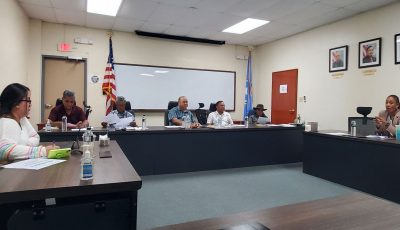IPI affiliates ask why CCC wants to be in federal court
Reiterating their position that the case is procedurally odd, two subsidiaries of the Imperial Pacific International (CNMI) LLC are questioning why the Commonwealth Casino Commission, which is a local government entity, is begging to be in federal court in connection with IPI’s lawsuit, despite regulations providing for exclusive jurisdiction in the CNMI Superior Court.
In their motion filed Monday to return IPI’s lawsuit against CCC to the Superior Court, IPI subsidiaries Grand Marianas (CNMI) LLC and Imperial Pacific Properties LLC, said the entirety of their claims require a determination of state law before the federal law is even addressed.
Grand Marianas and Imperial Pacific Properties, through counsel Matthew T. Gregory and Braddock J. Huesman, asked the U.S. District Court for the NMI to abstain from determining the federal issues and remand the case, in whole or in part, to the Superior Court.
In IPI’s separate motion filed Monday for remand, IPI counsel Viola Alepuyo and Phillip J. Tydingco asserted that the law and the facts justify returning their claims, if not their lawsuit, to the Superior Court.
In making their case, Alepuyo and Tydingco cited the forum selection clause, the abstention doctrines of Pullman and Burford, abstention under Covenant, and the lack of supplemental jurisdiction and/or declining to exercise supplemental jurisdiction.
Under the Pullman doctrine, a federal court may abstain or choose not to hear a case, until the state law question can be resolved in state court.
The Burford abstention doctrine essentially concerns protecting complex state administrative processes from undue federal interference.
IPI filed the lawsuit in June to prevent the CCC from publicly disclosing IPI’s audited financial information in response to Rep. Edwin Propst (Ind-Saipan) Open Government Act request. Superior Court Associate Judge Kenneth L. Govendo granted IPI’s TRO request.
Last month, CCC moved to transfer IPI’s complaint to the U.S. District Court. District Court Chief Judge Ramona V. Manglona subsequently extended the TRO to tomorrow, Thursday, since there was a lot of materials in the case that she had to look over.
In their motion to remand, Gregory and Huesman said the due process claims of Grand Marianas and Imperial Pacific Properties are dependent on interpretation of state law and whether or not their records are confidential.
If, for example, the subsidiaries’ records do not qualify as protected under either the Commission Act or the CNMI Open Government Act, then they have no federal claim, Gregory and Huesman said.
If, however, the subsidiaries’ records are protected and the Commonwealth Casino Commission released them, then a due process right becomes immediately apparent, they added.
Gregory and Huesman said when CCC decided to give itself a home-court advantage in the CNMI by drafting and publishing regulations requiring that all issues with the casino license it grants be resolved within the “exclusive jurisdiction” of the CNMI court, they waived the ability to remove the case to federal court.
Gregory and Huesman said if the federal court is not inclined to remand based on waiver, the subsidiaries would urge the court to remand the case, in part or in whole, based on abstention.
In IPI’s motion to remand, Alepuyo and Tydingco said the forum selection clause in this case is not only a mandatory contractual provision, but it is also an enforceable CCC regulation.
Alepuyo and Tydingco said the dominant and central focus of this litigation involved whether CCC can lawfully disclose certain tax and financial information of the Saipan exclusive casino licensee, IPI, under the Open Government Act, the Commonwealth Gaming Act and Commonwealth tax laws.
The lawyers said whether disclosure of such information comports with IPI’s exclusive casino license involves an interpretation of the casino license.



























